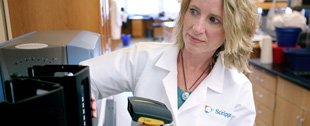Home » Translational Research » Research Highlights » Here
In this section
Consumer Genomics
 Rashaad Forehand, one of the Scripps Health employees who participate in the Scripps Genomic Health Initiative, and Eric J. Topol, M.D., Director of the Scripps Translational Science Initiative and Scripps Genomic Medicine
Rashaad Forehand, one of the Scripps Health employees who participate in the Scripps Genomic Health Initiative, and Eric J. Topol, M.D., Director of the Scripps Translational Science Initiative and Scripps Genomic Medicine
Scripps Genomic Health Initiative
Initiated in 2008, the Scripps Genomic Health Initiative (SGHI) is the first large-scale and long-term evaluation of the attitudes and perceptions of consumers who have purchased a commercially available personal genomic risk assessment test. A total of 3,630 consumers, whose ages range from 18 to 85 years, agreed to participate in the study.
Over a 20-year period, SGHI will determine whether personal genomic testing improves health by motivating people to make positive lifestyle changes, such as exercising, eating healthy and quitting smoking, and to obtain medical check-ups and tests.
“Our study prospectively evaluates the effect that state-of-the-art gene scans have on people’s lifestyles, behaviors, diets and psyches,” noted Eric J. Topol, M.D., Director of the Scripps Translational Science Institute (STSI) and Scripps Genomic Medicine (SGM).
Each study participant provided a saliva sample for the direct-to-consumer test, which scanned the individual’s DNA code for markers that have been previously linked to potential disease risk estimates.
Before the participants received their genomic risk assessment test results, baseline evaluations were conducted. At three- and 12-month intervals, the SGHI research team tracks the participants’ lifestyle via their responses on a self-reported health assessment questionnaire. Participants have agreed to conduct periodic health surveys over the next 20 years so that their behavioral response to genomic risk assessment can be evaluated longitudinally.
The initial results from the SGHI study were published online Jan. 12, 2011 by the New England Journal of Medicine. Dr. Topol and his colleagues reported that they did not find evidence that the screenings induced psychological anxiety among the study participants. Among those participants whose scans showed a high risk for developing a disease, a significant proportion expressed strong intent to undergo the corresponding health screening test, the STSI scientists noted in their NEJM paper.
“These tests have been harshly criticized by the medical community and government agencies, but until now there were no data,” said Dr. Topol. “Early detection is a critical factor in preventing most diseases, yet a lot of us don’t get our health screenings as recommended. For instance, only about half of the people who should get colonoscopies actually do.”
“A major concern raised regarding these tests is the possibility they will lead to high levels of anxiety in consumers who receive estimates of high genetic risk,” said Cinnamon Bloss, Ph.D., STSI clinical psychologist and lead author of the NEJM paper. “But our data suggest this is not the case.”
While the study revealed some promising findings, Bloss noted that improved lifestyle, such as increased exercise or lower fat intake, did not characterize the participants after learning their test results. “This was not necessarily surprising, however, given how difficult it is to both measure, as well as affect behavior change in these areas.”
In the Sept. 2010 issue of Genetics in Medicine, SGHI researchers reported their analysis of the participants’ responses to questions prior to their receiving results from the genetic tests. The researchers noted that almost 50% of the participants expressed overall concern about the personal genomic risk assessment test and about participating in the SGHI. Despite their concerns, all participants provided a saliva sample for the direct-to-consumer test.
 Rashaad Forehand explained his participation in the program: “My grandfather had prostate cancer. And on my mom’s side, they tend to have high blood pressure. I think a lot of people don’t live as long because diseases sneak up on them, and by the time they find out, it’s too late. Knowing something gives you the opportunity to do something about it.”
Rashaad Forehand explained his participation in the program: “My grandfather had prostate cancer. And on my mom’s side, they tend to have high blood pressure. I think a lot of people don’t live as long because diseases sneak up on them, and by the time they find out, it’s too late. Knowing something gives you the opportunity to do something about it.”
The researchers’ analysis found that the subgroups with the most concerns about genetics testing were women, health care organization employees, those with higher education, those younger in age, and those with higher trait anxiety at baseline behavioral testing. The privacy of the test results was the consumers’ most common concern.
Their analysis also revealed that over 82% of the consumers said that they would want to know their genetic risks even for diseases that can not be prevented. “Notably, no individuals in our study indicated that they would definitely not want to know their risk for a non-preventable disease,” said Dr. Bloss, lead author of the Genetics in Medicine paper.
While women expressed the most uncertainty about learning genetic test results on diseases that can not be prevented, previous studies have revealed that females were more likely than males to request and undergo predictive genetic testing for the non-preventable Huntington disease.
Those who were unsure about whether they would want to know their genetic risk for non-preventable diseases indicated that they would consider receiving this information if “one could live life differently” after learning the test results.
Dr. Bloss and her research colleagues pointed out that the SGHI’s participants do not represent the broader population of consumers. Most participants are Caucasian, almost 99% of them said that they had health insurance, and the majority reported that they believe their current health status to be “very good.” Most were employed by health and technology companies when they chose to purchase the personalized genomic risk assessment. In addition, the participants did not seek out testing of their own desire or volition. Although they were recruited, they had to pay for the testing.
In addition to STSI/SGM and Scripps Health, co-sponsors of SGHI have included Navigenics, Inc.,which provided its personal genomic risk assessment tool, the Navigenics™ Health Compass, at a discounted rate to consumers who participated in SGHI. Other co-sponsors have been Affymetrix and Microsoft Corp. Affymetrix scanned each participant’s DNA code, and Navigenics interpreted the scan results and offered personalized guidance on steps to lessen the chances of negative health impact. This information is available to participants on Navigenics’ secure web site. Each participant has been allowed to enter and store clinical and lifestyle information in an individual Microsoft HealthVaultTM account, allowing the participant to manage his or her personal health information in one location and share it, as desired, with health care providers.
To protect the privacy of participants’ genetic information, traditional identifying information for saliva samples and self-reported health assessment questionnaires have not been used. Instead, the information has been de-identified, encoded, encrypted and kept in a secure database.
More information:
- Nature Biotechnology editorial cites research findings from the Scripps Genomic Health Initiative published in the New England Journal of Medicine.
- “Scripps study in NEJM first to assess consumer impact of personal genetic tests.” Jan. 12, 2011 Scripps Health news release.
- “Effect of direct-to-consumer genomewide profiling to assess disease.” Bloss, CS, Schork, NJ, Topol, EJ. NEJM. 10.1056. 2011 Jan. 12.
- Associated Press article, “Consumers not fazed by DNA health results”: http://online.wsj.com/article/APd370c32b9e334677ad36c4df2d711599.html
- HeartWire article, “Direct-to-consumer genome scans do not affect short-term behavior”: http://www.theheart.org/article/1171169.do
- Navigenics video: “Expert discussion: NEJM article exploring the impact of personal genomics”: http://blog.navigenics.com/articles/comments/expert_discussion_nejm_article_exploring_the_impact_of_personal_genomics/
- “Consumer perceptions of direct-to-consumer personalized genomic risk assessments.” Genetics in Medicine. Sept. 2010
- GenomeWeb Daily News: “DTC Testing Survey Spotlights Acceptance and Concerns”
- Scripps Health news release, Oct. 9, 2008
